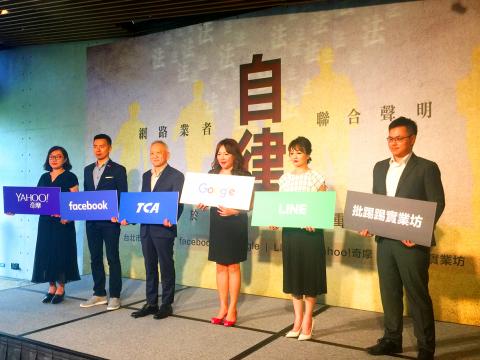Facebook, Line, Yahoo-Kimo (雅虎奇摩) and Google, as well as the Professional Technology Temple online academic bulleting board and the Taipei Computer Association, yesterday ramped up their efforts to combat misinformation ahead of the elections in January next year.
In a joint statement, the social media platforms said that they have voluntarily signed a self-discipline pledge to intensify efforts to crack down on fake accounts and to contain the spread of misinformation.
The announcement came as social media platforms and online companies have faced a backlash from lawmakers worldwide for what many have perceived as insufficient efforts to contain the spread of misinformation in election campaigns.

Photo: Liao Chien-ying, Taipei Times
Facebook has been allocating resources to technologies and personnel to detect false news and reduce online misinformation, company official Chen I-Ju (陳奕儒) said in the joint statement.
The company has been promoting news literacy among the public, Chen said.
Google said that it has arranged a series of activities over the past years to combat online misinformation, with the aim of increasing news literacy and promoting online security among the public, as well as boosting the company’s fact-checking efforts.
Yahoo-Kimo said that it has collected more than 2,200 high-quality articles from about 200 news outlets to provide diverse viewpoints, adding that it has worked with partners to improve fact-checking efforts.
A report released through V-Dem’s Digital Society Project found that Taiwan has been exposed to misleading viewpoints or misinformation disseminated by foreign governments and their agents more often than any other nation, Minister Without Portfolio Lo Ping-cheng (羅秉成) said in the statement.
The government would work with the private sector to fight misinformation, Lo said.

Taiwanese actress Barbie Hsu (徐熙媛) has died of pneumonia at the age of 48 while on a trip to Japan, where she contracted influenza during the Lunar New Year holiday, her sister confirmed today through an agent. "Our whole family came to Japan for a trip, and my dearest and most kindhearted sister Barbie Hsu died of influenza-induced pneumonia and unfortunately left us," Hsu's sister and talk show hostess Dee Hsu (徐熙娣) said. "I was grateful to be her sister in this life and that we got to care for and spend time with each other. I will always be grateful to

UNITED: The premier said Trump’s tariff comments provided a great opportunity for the private and public sectors to come together to maintain the nation’s chip advantage The government is considering ways to assist the nation’s semiconductor industry or hosting collaborative projects with the private sector after US President Donald Trump threatened to impose a 100 percent tariff on chips exported to the US, Premier Cho Jung-tai (卓榮泰) said yesterday. Trump on Monday told Republican members of the US Congress about plans to impose sweeping tariffs on semiconductors, steel, aluminum, copper and pharmaceuticals “in the very near future.” “It’s time for the United States to return to the system that made us richer and more powerful than ever before,” Trump said at the Republican Issues Conference in Miami, Florida. “They

REMINDER: Of the 6.78 million doses of flu vaccine Taiwan purchased for this flu season, about 200,000 are still available, an official said, following Big S’ death As news broke of the death of Taiwanese actress and singer Barbie Hsu (徐熙媛), also known as Big S (大S), from severe flu complications, the Centers for Disease Control (CDC) and doctors yesterday urged people at high risk to get vaccinated and be alert to signs of severe illness. Hsu’s family yesterday confirmed that the actress died on a family holiday in Japan due to pneumonia during the Lunar New Year holiday. CDC Deputy Director-General Tseng Shu-hui (曾淑慧) told an impromptu news conference that hospital visits for flu-like illnesses from Jan. 19 to Jan. 25 reached 162,352 — the highest

TAIWAN DEFENSE: The initiative would involve integrating various systems in a fast-paced manner through the use of common software to obstruct a Chinese invasion The first tranche of the US Navy’s “Replicator” initiative aimed at obstructing a Chinese invasion of Taiwan would be ready by August, a US Naval Institute (USNI) News report on Tuesday said. The initiative is part of a larger defense strategy for Taiwan, and would involve launching thousands of uncrewed submarines, surface vessels and aerial vehicles around Taiwan to buy the nation and its partners time to assemble a response. The plan was first made public by the Washington Post in June last year, when it cited comments by US Indo-Pacific Commander Admiral Samuel Paparo on the sidelines of the Shangri-La Dialogue